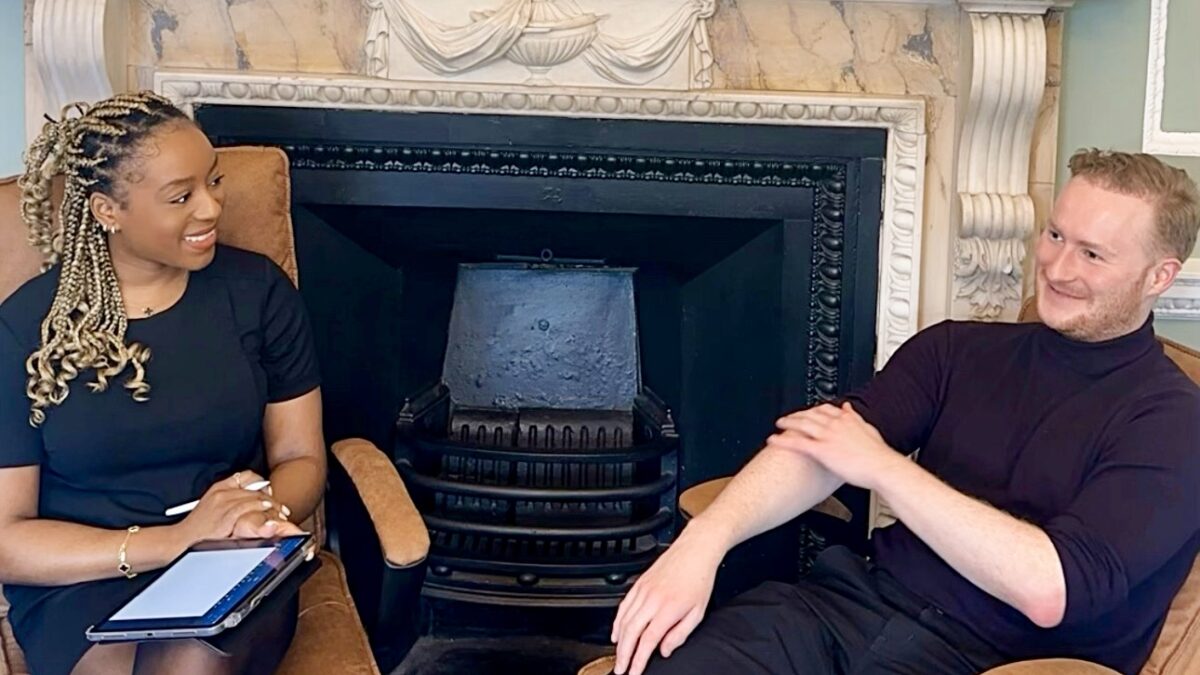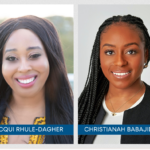
Interview with Jacqui Rhule-Dagher, Solicitor at Hogan Lovells and Founder of Legally Lesbians
June 3, 2024
Commercial Awareness Update – W/C 10th June 2024
June 10, 2024By Christianah Omobosola Babajide.
Reading time: seven minutes
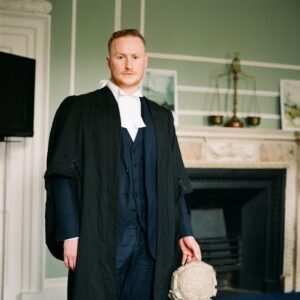
On a Friday afternoon in late May, the trees in Lincoln’s Inn Fields sway gently in a breeze while a warm ray of sunlight filters through the windows of Garden Court Chambers. However, Oscar Davies has no time on this day for the scenery outside their office, nor for the gentle hum of the city awakening around them. They are engrossed in a conversation with me that is unfolding naturally, about the importance of respect, what non-binary day means to them and their recent feature in the Evening Standard.
The interview begins on an unexpectedly sweet note. Davies, ever the thoughtful host, surprises me with a Krispy Kreme donut—a small gesture that instantly sets a warm and friendly tone. This isn’t an interview in the traditional sense; it’s more of a candid conversation, flowing seamlessly from one topic to another. The initial exchange turns to the true meaning of respect, a subject Davies speaks on with quiet passion.
“In all of my advocacy work around trans rights, it always comes back to a central point. We are just seeking a baseline level of respect for people’s fundamental rights. It is not complicated or asking much. That may be their privacy rights, or right to healthcare. Or the right to be themselves without castigation, in their true identity, whatever that may be,” they explain, their eyes reflecting the seriousness of the topic. They pause, choosing their words with precision. “If there are gaps in equality law, I query why the gap is there and if we can do anything to fill it. There are clear gaps in equality law for non-binary and gender-fluid people.”
As they speak, it becomes clear that Davies is sharing a core set of values, that guide their interactions both in and out of the courtroom. Their voice is calm but carries a weight of conviction, each word carefully measured. This dedication to the principle of respect, they explain, is essential not only in their professional life but in every aspect of human connection.
Davies leans back, a thoughtful smile playing on their lips. The conversation meanders through various topics, yet always circles back to this central theme. It’s a reflection of their belief that respect is not a mere add-on, but the bedrock of meaningful interaction.
As the conversation wraps up, it is clear that Davies is more than just a barrister with a sharp legal mind; they are a person who holds their principles close, weaving them into the fabric of their everyday life.
Interview
COB: Can you tell us about your journey to becoming a barrister and what inspired you to pursue a career in law?
OD: I have a performance background in classical and jazz music, at school I did a few performances a week.
I then studied a French and History undergrad at Kings, with a choral scholarship. I ended up doing my dissertation and all my elective modules on gender theory, through either early modern history or French women’s writing. I am thankful to some of the amazing feminist teachers who taught me along the way. I was torn between professions: journalism, diplomat and law. I ended up going for the Bar as I could still use my performance skills but in a different context, and exercise my brain sufficiently to keep me interested.
COB: What does international non-binary day mean to you?
OD: I am a bit wary of the box ticking exercise of these types of days, and the purpose of them. But I do believe in the need for visibility, so I think the day helps to create space for non-binary people in the public sphere. It is important for people to realise that we are here – every day of the year – and we are not some sort of made up concept or belief.
COB: Do you think non-binary people have enough legal protections?
OD: Not at all. There is no UK based legislation that mentions the word(s) ‘non-binary’ currently enacted. This needs to change, as it makes protections for non-binary people fragile.
There are cases such as Taylor v Jaguar Land Rover 1304471/2018 and R (AA and others) v National Health Service Commissioning Board [2023] EWCA Civ 902, but these are only first instance decisions. Nonetheless, they consider that non-binary/gender-fluid falls under s.7 Equality Act 2010, which is entitled (somewhat awkwardly) ‘gender reassignment’.
In contrast, there are at least 15 other countries where their governments recognise non-binary in some way, whether it is having a third gender on passports, such as ‘X’, or permitting marriage between people who are non-binary.
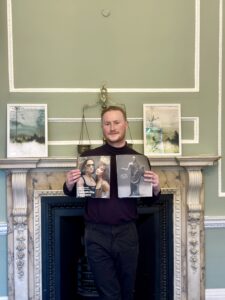 COB: As an award-winning barrister and advocate for the LGBTQ+ community, is there still a need for pride?
COB: As an award-winning barrister and advocate for the LGBTQ+ community, is there still a need for pride?
OD: Of course. The weaponisation of pride by certain groups is such a sad thing to see and live through, especially when weaponisation can be from marginalised groups inside (and outside of) the community. Rights are not mutually exclusive and can be expanded outwards. For people to think that rights necessarily infringe onto others is completely misunderstanding the function of human rights and the rule of law.
COB: What challenges have you faced as a non-binary barrister, and how have you overcome them?
OD: It has not been an easy journey. I first got pupillage at a media law chambers which, five months before starting pupillage, told me it was dissolving. So had to get pupillage again. That chambers didn’t take me so did a third six, and since then I have moved to my current chambers Garden Court. It has been a wild ride! But not one that I would change; I think the difficulties I have faced have made me a better advocate, in all senses of the word.
I suppose the point is if you think you have what it takes, and you have all the necessary requirements to get to pupillage interviews (strong grades, scholarships, pro bono work, mini-pupillages etc.) then, with a lot of perseverance and a bit of luck, you should be able to make it.
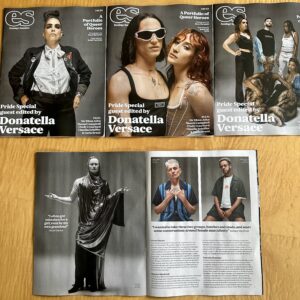 COB: You were recently featured in the Evening Standard Magazine’s Pride Issue 2024. How did it feel to be recognised in such a prominent publication?
COB: You were recently featured in the Evening Standard Magazine’s Pride Issue 2024. How did it feel to be recognised in such a prominent publication?
OD: Very validating of course. The law can be a strange and is often perceived as a boring profession, so it was nice to add some glam to the mix with the great team at ES Magazine. And the fact that Donatella Versace (guest editor for the edition) saw and chose my picture is iconic.
COB: Winning the ‘LGBTQ+: Champion of the Year’ award at the Legal 500 ESG Awards 2024 is a significant achievement. Tell us about this moment.
OD: That was pretty cool I have to say! I never thought I was the type of person to win a legal award, so to have one so early in my career is very exciting. Weirdly I was nominated in two categories at the Legal 500 ESG Awards. My other category was ‘D&I rising star’, with fewer candidates, so I thought if I win any at all, it is more likely to be that one.
The category that I ended up winning was ‘LGBTQ+: Champion of the Year’ – this was a complete shock, given that there were six co-nominees and two of them were KCs! I am grateful to the Legal 500 research team in that my advocacy work around trans and non-binary rights – most of which is unpaid/pro bono – was noticed and validated in the legal sphere.
COB: Can you describe a particularly memorable case you’ve worked on and what you learned from it?
OD: Earlier this year I took on an education case via Advocate (the Bar’s pro bono charity) with my colleague Ollie Persey.
The pupil, who was non-binary and had learning difficulties, had been permanently excluded. I attended the appeal hearing and the panel overturned the original decision stating that it was wrong on almost all the legal grounds we had pleaded.
The school still was resistant, and so with the assistance of Simpson Millar via legal aid, we drafted a pre-action letter for judicial review. Finally, the school allowed the non-binary pupil back. This was a particularly special win, as a pupil who is non-binary and has special educational needs faced significant institutional challenges, so it was great to be able to put them back onto the correct/better path, which in turn may have an impact on their future success.
COB: Looking ahead, do you have anything exciting in the pipeline?
OD: Yes! I have my book in the pipeline, my current baby. It is about non-binary legal recognition and how deconstructing the gender binary would help everyone, not just trans people. And then how the law translates this. It is a bit of a campaign/policy book, but it is also a reimagining book, on how we can have better law that is less restricted by the gender binary. Hopefully it will be out next year.
COB: What advice would you give to non-binary individuals aspiring to enter the legal profession?
OD: As long as your safety is not infringed, just go for it! The legal profession is, in my experience, much more welcoming to non-binary people than it might seem from the outside.
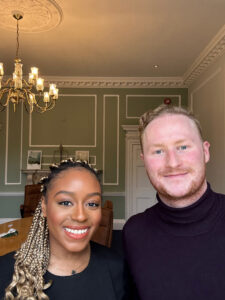 Quick-fire questions…
Quick-fire questions…
COB: What’s your favourite anime?
OD: I love anything Studio Ghibli, but probably Nausicaä of the Valley of the Wind. It is so gorgeous and expansive.
COB: Name one thing most people don’t know about you.
OD: When I was a baby I was called ‘bubbles’ because I would sit in my cot and blow bubbles for hours on end.
COB: If you weren’t a barrister, what would you be doing?
OD: Travelling probably without a care in the world. If only money didn’t exist!
COB: One thing you can’t live without?
OD: Sparkling water!
Follow Oscar on social media:


